- I nfographics
- Show AWL words
- Subscribe to newsletter
- What is academic writing?
- Academic Style
- What is the writing process?
- Understanding the title
- Brainstorming
- Researching
- First draft
- Proofreading
- Report writing
- Compare & contrast
- Cause & effect
- Problem-solution
- Classification
- Essay structure
- Introduction
- Literature review
- Book review
- Research proposal
- Thesis/dissertation
- What is cohesion?
- Cohesion vs coherence
- Transition signals
- What are references?
- In-text citations
- Reference sections
- Reporting verbs
- Band descriptors
Show AWL words on this page.
Levels 1-5: grey Levels 6-10: orange
Show sorted lists of these words.
Any words you don't know? Look them up in the website's built-in dictionary .
Choose a dictionary . Wordnet OPTED both

Writing objectively How and when to use an impersonal tone
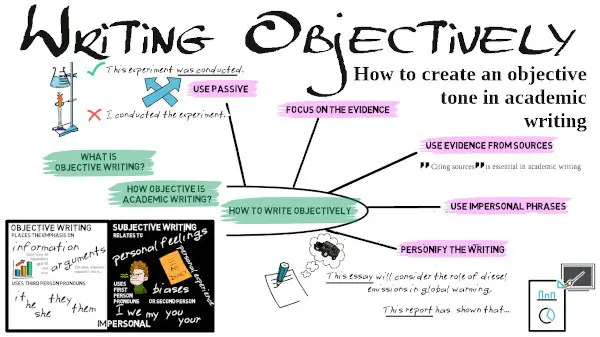
For another look at the same content, check out the video on YouTube (also available on Youku ). There is a worksheet (with answers and teacher's notes) for this video.
Academic writing is generally impersonal and objective in tone. This section considers what objective writing is , how objective academic writing is , then presents several ways to make your writing more objective . There is also an academic article , to show authentic examples of objective language, and a checklist at the end, that you can use to check the objectivity of your own writing.
What is objective writing?
Objective writing places the emphasis on facts, information and arguments, and can be contrasted with subjective writing which relates to personal feelings and biases. Objective writing uses third person pronouns (it, he, she, they), in contrast to subjective writing which uses first person pronouns (I, we) or second person pronoun (you).
How objective is academic writing?
Although many academic writers believe that objectivity is an essential feature of academic writing, conventions are changing and how much this is true depends on the subject of study. An objective, impersonal tone remains essential in the natural sciences (chemistry, biology, physics), which deal with quantitative (i.e. numerical) methods and data. In such subjects, the research is written from the perspective of an impartial observer, who has no emotional connection to the research. Use of a more subjective tone is increasingly acceptable in areas such as naturalist research, business, management, literary studies, theology and philosophical writing, which tend to make greater use of qualitative rather than quantitative data. Reflective writing is increasingly used on university courses and is highly subjective in nature.
How to write objectively
There are many aspects of writing which contribute to an objective tone. The following are some of the main ones.
Use passive
Objective tone is most often connected with the use of passive, which removes the actor from the sentence. For example:
- The experiment was conducted.
- I conducted the experiment.
- The length of the string was measured using a ruler.
- I measured the length of the string with a ruler.
Most academic writers agree that passive should not be overused, and it is generally preferrable for writing to use the active instead, though this is not always possible if the tone is to remain impersonal without use of I or other pronouns. There is, however, a special group of verbs in English called ergative verbs , which are used in the active voice without the actor of the sentence. Examples are dissolve, increase, decrease, lower, and start . For example:
- The white powder dissolved in the liquid.
- I dissolved the white powder in the liquid.
- The white powder was dissolved in the liquid.
- The tax rate increased in 2010.
- We increased the tax rate in 2010.
- The tax rate was increased in 2010.
- The building work started six months ago.
- The workers started the building work six months ago.
- The building work was started six months ago.
Focus on the evidence
Another way to use active voice while remaining objective is to focus on the evidence, and make this the subject of the sentence. For example:
- The findings show...
- The data illustrate...
- The graph displays...
- The literature indicates...
Use evidence from sources
Evidence from sources is a common feature of objective academic writing. This generally uses the third person active. For example:
- Newbold (2021) shows that... He further demonstrates the relationship between...
- Greene and Atwood (2013) suggest that...
Use impersonal constructions
Impersonal constructions with It and There are common ways to write objectively. These structures are often used with hedges (to soften the information) and boosters (to strengthen it) . This kind of language allows the writer to show how strongly they feel about the information, without using emotive language, which should be avoided in academic writing.
- It is clear that... (booster)
- It appears that... (hedge)
- I believe that...
- There are three reasons for this.
- I have identified three reasons for this.
- There are several disadvantages of this approach.
- This is a terrible idea.
Personify the writing
Another way to write objectively is to personify the writing (essay, report, etc.) and make this the subject of the sentence.
- This essay considers the role of diesel emissions in global warming.
- I will discuss the role of diesel emissions in global warming.
- This report has shown that...
- I have shown that...
In short, objective writing means focusing on the information and evidence. While it remains a common feature of academic writing, especially in natural sciences, a subjective tone is increasingly acceptable in fields which make use of qualitative data, as well as in reflective writing. Objectivity in writing can be achieved by:
- using passive;
- focusing on the evidence ( The findings show... );
- referring to sources ( Newbold (2021) shows... );
- using impersonal constructions with It and There ;
- using hedges and boosters to show strength of feeling, rather than emotive language;
- personifying the writing ( This report shows... ).
Bailey, S. (2000). Academic Writing. Abingdon: RoutledgeFalmer
Bennett, K. (2009) 'English academic style manuals: A survey', Journal of English for Academic Purposes , 8 (2009) 43-54.
Cottrell, S. (2013). The Study Skills Handbook (4th ed.) , Basingstoke: Palgrave MacMillan.
Hinkel, E. (2004). Teaching Academic ESL Writing: Practical Techniques in Vocabulary and Grammar . Mahwah: Lawrence Erlbaum Associates Inc Publishers.
Hyland, K. (2006) English for Academic Purposes: An advanced resource book . Abingdon: Routledge.
Jordan, R. R. (1997) English for academic purposes: A guide and resource book for teachers . Cambridge: Cambridge University Press.
Example article
Below is an authentic academic article. It has been abbreviated by using the abstract and extracts from the article; however, the language is unchanged from the original. Click on the different areas (in the shaded boxes) to highlight the different objective features.
Title: Obesity bias and stigma, attitudes and beliefs among entry-level physiotherapy students in the Republic of Ireland: a cross sectional study. Source: : https://www.sciencedirect.com/science/article/pii/S0031940621000353

GET FREE EBOOK
Like the website? Try the books. Enter your email to receive a free sample from Academic Writing Genres .
Below is a checklist for using objectivity in academic writing. Use it to check your writing, or as a peer to help. Note: you do not need to use all the ways given here.
Next section
Read more about writing critically in the next section.
- Critical writing
Previous section
Go back to the previous section about using complex grammar .
- Complex grammar

Author: Sheldon Smith ‖ Last modified: 05 February 2024.
Sheldon Smith is the founder and editor of EAPFoundation.com. He has been teaching English for Academic Purposes since 2004. Find out more about him in the about section and connect with him on Twitter , Facebook and LinkedIn .
Compare & contrast essays examine the similarities of two or more objects, and the differences.
Cause & effect essays consider the reasons (or causes) for something, then discuss the results (or effects).
Discussion essays require you to examine both sides of a situation and to conclude by saying which side you favour.
Problem-solution essays are a sub-type of SPSE essays (Situation, Problem, Solution, Evaluation).
Transition signals are useful in achieving good cohesion and coherence in your writing.
Reporting verbs are used to link your in-text citations to the information cited.
What is Objective Writing? Why Neutral Language Matters
What is objective writing? Master the skill of delivering unbiased information effectively with proven techniques and examples.
In today’s world, the way we present ideas and data can shape opinions, influence decisions, and impact the world around us. One of the most important principles of communication is objectivity. Objective writing is writing that presents information in a neutral and unbiased way. This means avoiding personal opinions, beliefs, or biases. It also means avoiding using emotional language or making subjective statements. Objective writing is typically clearer and easier to understand than subjective writing. It is also seen as more credible and trustworthy. This is because readers know that the writer is not trying to persuade them or influence their opinions.
Related article: Mastering Critical Reading: Uncover The Art Of Analyzing Texts
In a world where there is so much information available, it is more important than ever to be able to distinguish between objective and subjective writing. Objective writing is essential for fostering critical thinking and making informed decisions. This article will explore the importance of objective writing and its role in communication. We will look at how objective writing can be used to foster credibility, deliver accurate information, and promote critical thinking.
What Is Objective Writing?
Objective writing is a style of writing that presents information in a neutral and unbiased manner, without expressing personal opinions, emotions, or beliefs. The primary goal of objective writing is to provide facts, evidence, and logical reasoning to inform the reader without trying to persuade or influence their opinion.
About the question “What is objective writing?”, the author, in this kind of writing, strives to eliminate any potential bias, avoid making value judgments, and maintain a professional and impartial tone. This type of writing is commonly used in news reporting, scientific research papers, academic essays , and other forms of non-fiction writing.
Benefits Of Writing Objectively
Clarity and Understanding: Objective writing presents information in a clear and unbiased manner, allowing readers to conceive the facts without being influenced by the writer’s personal opinions or emotions. This promotes a deeper understanding of the subject matter.
Credibility and Trustworthiness: Objective writing enhances the credibility of the writer and the content. When information is presented without bias, readers are more likely to trust the accuracy and reliability of the material.
Unbiased Evaluation: Objectivity enables fair evaluation of different viewpoints, arguments, and evidence. It allows readers to form their own opinions based on the presented facts, rather than being persuaded by the writer’s subjective views.
Professionalism in Academic and Formal Writing: In academic and formal settings, objective writing is expected as it upholds the standards of professionalism and integrity in research, essays, and reports.
Conflict Resolution: Objective writing is particularly valuable in discussions and debates, as it helps to reduce conflicts by focusing on facts rather than personal feelings or biases.
Avoiding Stereotypes and Prejudices: Writing objectively helps to avoid reinforcing stereotypes and prejudices, promoting a more inclusive and open-minded perspective.
Enhanced Critical Thinking: By analyzing information objectively, writers and readers can engage in deeper critical thinking, questioning assumptions, and considering alternative viewpoints.
Appropriate in Scientific and Technical Fields: In scientific and technical writing, objectivity is essential to maintain the accuracy and validity of research findings and technical information.
Global Audience Accessibility: Objective writing is more accessible to a diverse global audience, as it transcends cultural and individual differences, making the content relevant to a broader readership.
Ethical Reporting: Journalists and reporters strive for objectivity in their news reporting to provide unbiased and truthful information to the public, upholding ethical standards in journalism.
Overall, writing objectively fosters transparency, fairness, and respect for differing perspectives, contributing to more informed, trustworthy, and inclusive communication.
Subjectivity Writing
Subjectivity and objectivity are two fundamental aspects of writing that influence how information is presented and perceived. Subjectivity refers to the presence of personal opinions, feelings, and biases in writing. It involves the writer’s perspective, emotions, and interpretations, which can impact how they convey information to the reader.
What Is Subjective Writing?
Subjective writing is a style of writing where the author expresses their personal opinions, emotions, and viewpoints on a particular subject. In subjective writing, the author’s feelings, beliefs, and individual experiences play a significant role in shaping the content. This type of writing often uses first-person pronouns, such as “I” or “we,” and employs emotional language to convey the author’s thoughts and emotions.
Subjective writing is prevalent in creative writing, personal essays, memoirs, and certain types of journalistic pieces, such as opinion columns or editorials. It allows writers to connect with the reader on a more personal level, sharing their unique perspectives and inviting the audience to empathize with their point of view.
The Difference Between Objective And Subjective Writing
It’s essential to recognize that both objective and subjective writing have their place in various contexts. Objective writing provides factual information and encourages critical thinking, while subjective writing allows for self-expression and emotional engagement. The choice between the two depends on the writer’s intentions, the subject matter, and the target audience.
Understanding the difference between objective and subjective writing enables writers to choose the appropriate style based on their intended purpose and the expectations of their audience. It also empowers readers to identify when they are encountering subjective content and approach it with a discerning mindset, acknowledging the presence of the author’s perspective.
Elements Of Objective Writing
Objective writing is characterized by its neutral and unbiased approach to presenting information. Writers strive to eliminate personal biases and emotions, focusing on factual accuracy and logical reasoning. Several key elements contribute to achieving objectivity in writing:
Avoiding Personal Pronouns
Objective writing minimizes the use of personal pronouns like “I,” “we,” or “you.” By avoiding these pronouns, the writer maintains a level of distance between themselves and the content, making it less likely for their personal opinions or biases to influence the information presented. Instead of writing, “I believe that,” or “In my opinion,” the objective writer would present the information without explicitly inserting themselves into the narrative. For example, “According to research,” or “Studies indicate that.”
Focusing On Facts, Not Emotions Or Opinions
Objective writing prioritizes the presentation of verifiable facts, evidence, and data over personal emotions or opinions. The writer should refrain from using emotionally charged language or expressing their feelings about the subject matter. Instead, they rely on evidence-based information to support their claims. When presenting an argument or discussing a topic, the focus is on logical reasoning and empirical support rather than emotional persuasion.
Using An Active Voice And Ergative Verbs
The active voice is preferred in objective writing because it clearly identifies the subject and the action they are performing. This contributes to clarity and directness in the writing. In contrast, the passive voice can sometimes be used to obscure responsibility or agency, potentially leading to less objective writing. Ergative verbs, which don’t require an object to complete their meaning, can also help make sentences more concise and focused.
Example (Active Voice): “The committee made the decision.” Example (Passive Voice): “The decision was made by the committee.”
Referencing Sources For Evidence And Support
Objective writing relies heavily on evidence and support from reputable sources. By referencing and citing authoritative works, research studies, experts, and reliable data, the writer reinforces the credibility of their writing. These citations also allow readers to verify the information independently, adding transparency and accountability to the content.
Maintaining A Neutral Tone In The Writing
A neutral tone is crucial in objective writing. The language used should be professional, impartial, and devoid of emotional bias. The writer should avoid overly positive or negative language that could sway the reader’s perception. Instead, the content should present information objectively, allowing the readers to draw their conclusions based on the facts and evidence provided.
Example (Neutral Tone): “The study findings suggest a correlation between X and Y, according to the researchers’ analysis.”
Common Examples Of Objective Writing
Objective writing fosters transparency, credibility, and the dissemination of reliable information across various domains, contributing to an informed and knowledgeable society. This type of writing has distinct purposes: ensuring clear communication in instruction manuals, providing unbiased information in news reporting, and maintaining scientific rigor in natural science reports.
Instruction Manual
Instruction manuals are a classic example of objective writing. These documents provide step-by-step guidance on how to use a product or perform a specific task. Objective writing in instruction manuals focuses on clarity, precision, and neutrality. It avoids subjective language and personal opinions, instead using concise and straightforward language to ensure readers can follow the instructions accurately. The emphasis is on providing clear directions and information, leaving no room for ambiguity or misinterpretation.
Example (Objective Writing in an Instruction Manual): “Insert the round end of the cable into the designated port until you hear a click.”
News Reporting
News reporting is one of the primary domains where objective writing is crucial. Journalists aim to present news stories in a fair, accurate, and unbiased manner. Objective news articles provide the who, what, where, when, why, and how of an event without injecting personal opinions or emotions. They rely on credible sources, facts, and verified information to inform the public objectively. While opinion pieces and editorials allow for subjectivity, standard news reporting adheres to objective principles.
Example (Objective News Reporting): “In a press conference today, the Prime Minister announced new economic measures to address unemployment. The plan includes tax incentives for businesses and increased funding for job training programs.”
Natural Science Reports
Objective writing is a fundamental aspect of scientific reports, particularly in the field of natural sciences. Scientific reports present research findings, experiments, and observations without personal bias or emotional influence. The language used is precise and technical, and statements are supported by empirical evidence and data. Objectivity ensures that other researchers can replicate experiments and validate the conclusions, promoting the advancement of scientific knowledge.
Example (Objective Writing in a Natural Science Report): “The results of the study show a significant correlation between the increase in temperature and the rate of plant growth. The experiment was conducted over a three-month period, and the data were collected and analyzed using standard statistical methods.”
Browse Through 75,000+ Scientifically Accurate Illustrations In 80+ Popular Fields
Mind the Graph is a valuable platform that aids scientists by providing access to over 75,000 scientifically accurate illustrations in 80+ popular fields. With a user-friendly interface and customizable graphics, researchers can efficiently create visually appealing figures, diagrams, and infographics to enhance their visual communication and effectively convey complex concepts in their publications, presentations, and research materials. The high-quality graphics available on the platform ensure publication-ready visuals, saving time and streamlining the content creation process for scientists across diverse scientific disciplines.

Subscribe to our newsletter
Exclusive high quality content about effective visual communication in science.
Unlock Your Creativity
Create infographics, presentations and other scientifically-accurate designs without hassle — absolutely free for 7 days!
Content tags
Subjective vs. Objective Essay: Examples, Writing Guides, & Topics
Subjective or objective essay writing is a common task students have to deal with. On the initial stage of completing the assignment, you should learn how to differentiate these two types of papers. Their goals, methods, as well as language, tone, and voice, are different.
A subjective essay focuses on the writer’s personal opinion, while an objective one represents valid facts. So, be careful when composing an objective paragraph or paper. Don’t let your beliefs take over real arguments supported by substantial evidence.
In short, differences between these styles concern the following:
- The ground for objective essays is facts; for subjective essays – personal opinions and beliefs.
- Objective papers report the findings from scientific sources, while subjective ones describe the writer’s thoughts.
- The objective essay’s goal is to help the reader make a decision. Subjective writing aims to reflect the author’s vision of the issue.
So, if you face this task for the first time, you may need some explanations. Custom-writing.org experts prepared a list of tips on how to write objective and subjective essays. Some topics, as well as objective and subjective writing examples, will also be useful.
- 🆚 Subjective vs. Objective
🔗 References
🆚 subjective vs. objective essays.
First and foremost, let’s find out the critical differences between the writing styles. Take a look at the following table and shed light on this issue.
An objective essay is a presentation of the material with no independent opinion involved. Only facts matter in this paper, and only facts can back up some assertions. Writing subjective essays implies introducing your standpoint on a particular problem.
📋 How to Write an Objective Essay
Writing any essay consists of three parts: preparation, the actual writing, and revision. During the first one, you need to decide on your topic and do a little research. You can see how it looks in a real example.
Objective Essay Example: The Portrayal of Odysseus
In Odyssey, Homer portrays Odysseus, the king of Ithaca, as the true epic hero. The depiction of Odysseus is thoughtfully knitted together with the themes of love and loyalty that further magnify it, painting a holistic picture of a long 10-year journey home. Although it can be argued that some of Odysseus’s personality traits he displays cannot be applied to a true hero, he is still depicted following a very specific heroic archetype.
Now, let’s get into more detail!
Objective Essay Topics
If you’ve decided to write an objective essay, you need to come up with a topic. The topic gives a reader a brief overview of what will be covered in the paper.
Here are ten great examples:
- While the differences between Italy and Spain are evident, the resemblances are striking.
- There are several similarities between the movies “Deep Impact” and “Armageddon.”
- Compare and contrast the capitals of two English-speaking countries.
- Somatic symptoms in people with PTSD can be influenced by age, gender, and avoidance.
- Some might argue, but being overweight carries a social stigma.
- Environmental factors contribute to the phenotypic expression of psychological disorders.
- Although the exact reason remains unclear, depression is affected by sex, gender, hormonal changes, and age.
- When comparing and contrasting the Bible and Quran, it seems that they have more similarities than differences.
- Musical ability is the result of influence on the person from outside.
- In comparison to extroverts, introverts draw power from within themselves to use it in future activities.
Objective Essay Structure
We shall continue with exploring an essay structure. Note that the parts described below are essential for any essay.
- Introduction . The introduction is usually the part that broadly describes the topic and gets the interest of the reader. This part of the paper should cover some background information and present the purpose.
- Hypothesis . In case your essay has one, state it in your introduction. A hypothesis includes information about how you intend to prove or refute the claim. It briefly describes the way you intend to do so.
- Arguments . Present one side of the argument. In the next paragraph, present the opposing one, using such words as “however,” “nevertheless,” and “although.” The task is to provide the readers with two sides of the argument.
- Evidence . Provide the evidence for all of your points. Keep the balance in providing proof and refutal. Omit your personal opinion, rather than include the evidence you find informative and convincing.
- Conclusion . Summarize the arguments both for and against the position. While remaining objective, shortly go over the information you presented as evidence. If the instructions require a personal opinion, in conclusion, you might write one. In other cases, briefly recap the parts of the essay. Shorten sentence generator would be greatly beneficial in such endeavor.
📜 How to Write a Subjective Essay
As we’ve mentioned earlier, a subjective essay represents the author’s vision of a particular issue. You have an opportunity to introduce your point of view without supporting your ideas with evidence from the primary sources. However, make sure your arguments are still logical and adequate.
Now see how to write a subjective essay in the sections below.
Subjective Writing Example
A well-chosen topic is the vital determinant of a successful essay. Yet, the process of selecting an idea for your paper might be challenging. That’s why you may find our example helpful.
The rapid pace of development of modern technologies increases the demand for oil and gas every year. A considerable amount of these resources is necessary to maintain both industrial enterprises and private equipment. Despite active production, there are still many unexplored places on Earth, potentially rich in oil and gas deposits. However, while making them public would help solve the existing problem, I’m afraid I disagree with this proposal.
Subjective Essay Topics
Check our list of subjective essay topics, choose the one you like the most, or inspire and come up with your idea!
- The fake and too glamorous life presented in social media leads to the development of an inferiority complex among teenagers.
- The information flows within the country should not be controlled by the governments.
- Since developed nations provoked the climate crisis, they should take full responsibility for their past actions and reduce carbon emissions in the atmosphere.
- Cyberbullying should be a matter of the same importance as physical abuse.
- Remote learning opens more opportunities and expands the students’ horizons.
- Instead of catching up with fashion trends, it is better to develop your unique style.
- People should have enough rest to reduce the levels of anxiety and decrease the chances of depression.
- Studying abroad is an experience worth trying.
- Planning and scheduling are perfect strategies to deal with procrastination.
- While applying for a job position, work experience is more significant than having a degree.
📝 Subjective Essay Structure
When you deal with this task, you have full freedom of choice. You can decide for yourself what idea to support and what arguments to present. Still, you have to structure even a subjective essay properly.
Here are the elements you have to include in your paper:
- grab the readers’ attention;
- introduce your subject;
- state your position in the thesis statement.
Important note: your thesis should be clear and straightforward. Let your audience understand your opinion.
- Description . Dive deeper into your topic and describe your issue in detail. However, don’t go too far. Avoid including irrelevant facts and unnecessary information. Follow the principle “quality over quantity” to keep your reader engaged.
- Opinion . After describing your issue, move to the most crucial part of your essay—opinion. State it clearly and concisely. Although you don’t need to provide any evidence from scholarly sources, your ideas should be supported by substantial arguments or examples from your personal life.
- Conclusion . In the last paragraph of your subjective essay, restate your thesis statement. Don’t introduce any other ideas here. To make your paper more dynamic, ask a provocative question at the end. It may motivate your reader for further investigation of your subject.
A helpful tip:
Before submitting your work, make sure it is coherent. Check if all of your ideas follow the logical flow. To avoid redundancy and wordiness, mix shorter sentences with longer ones and apply transitional phrases. Polish your essay, turn it in, and wait for your perfect grade.
Thanks for reading the page! Share it with your peers who may need some guidance as well. Our writers are ready to explain any other essay type , not only objective or subjective ones.
Learn more on this topic:
- How to Write an Expository Essay in Simple Steps
- Nursing Reflective Essay Example and Guidelines for Students
- Essay on Dengue Fever: How to Write + Free Examples
- French Essay Writing: How-to Guide and Examples
- How to Write a Rebuttal Essay: Jackie Michael, Pen and the Pad
- Writing Objectively: OWLL, Massey University
- Subjective vs Objective: Difference and Comparison, Diffen
- Objective and Subjective Claims: TIP Sheet, Butte College
- Evidence: The Writing Center, University of North Carolina at Chapel Hill
- Organizing Your Argument: Purdue Online Writing Lab, College of Liberal Arts, University of Purdue
- Argumentative Paper Format: Courtesy the Odegaard Writing & Research Center, University of Washington
- How Do I Write an Intro, Conclusion, & Body Paragraph: LSA Sweetland Center for Writing, the University of Michigan
- Share to Facebook
- Share to Twitter
- Share to LinkedIn
- Share to email

Writing All About Me paragraph is probably one of the most usual assignments. For example, students might write it when entering an academic institution. Such work gives an opportunity to introduce yourself, your skills, and goals. However, it is not the only possible situation.

Coral reefs can be called one of the most amazing things created by nature. These structures can be found in tropical and temperate waters. Like many other unique natural phenomena, coral reefs are influenced by human activity these days. This negative impact is one of the significant issues to consider when...

An ambition essay focuses on one’s strong desire to achieve success in one or several areas. It might be one’s career, finance, family, art, health, or all at once. Writing an ambition essay, you might want to consider your own life or examples from the world literature. You can describe...
![example of objective essay Essay for Primary School: Simple Guide for Kids [with Samples]](https://custom-writing.org/blog/wp-content/uploads/2020/12/pupils-raising-hand-classroom-284x153.jpg)
The age of primary school students ranges from 5 to 11 years. At this stage of education, children start developing their writing skills. They make their first steps to analyzing and proving their points of view. Besides, they study how to write an essay for elementary school. Correctly preparing all...

Canadian identity is something that has become really important for many Canadians in the past fifty years. Canada is a big, multinational country with its own traditions, culture, and history. However, because of quite a large number of foreigners and even Americans, its culture and people are associated with the...

Let’s say you received a task to write an essay about cars. The topic might be interesting for you, but you may still have no idea how to organize your paper. Well, this article is for you.

Smoking can be viewed as one of the trendy habits. Numerous teenagers try it since they think that it is cool or can help them socialize. Often students start smoking due to stress or mental illnesses. But is it okay? Educators tend to give different written assignments, which may disclose...
![example of objective essay Child Labor Essay: Thesis, Examples, & Writing Guide [2024]](https://custom-writing.org/blog/wp-content/uploads/2020/12/child-working-in-cambodia-e1565628499749-284x153.jpg)
Children have always been apprentices and servants all over human history. However, the Industrial Revolution increased the use of child labor in the world. It became a global problem that is relevant even today when such employment is illegal.

Dissertation critique writing develops the students’ critical and logical thinking abilities. When composing, the students learn to analyze the works conducted by other researchers. To critique a dissertation, you should: Thoroughly read the paper.Take notes and summarize the text (you can even try and use auto summarizer for that).Interpret and...

An opinion essay is a formal piece of writing which presents the author’s point of view on a particular subject supported by reasoning and examples. The opposing viewpoint is also suggested, but it is followed by arguments that show its inconsistency. Take a look at the guide prepared by Custom-writing experts to...

So, you need to accomplish your discursive essay writing. The typical questions most students ask are: How do you write it? What is discursive essay? A discursive essay is an academic paper that involves a discussion on a particular topic. It is usually assigned to college students. You may be...

How to write a narrative essay? To do that, you need to know what a narrative essay is. It is an academic text usually written as a story and containing all the usual elements of a story. Narrative essays are often personal, experiential, and creative. Still, they should be made...
Very helpful to make my assignment. Thank you so much!

Glad to know that. Thank you very much, Farhana!
Subjective and reflective.
That’s right, Raj 🙂
Thank you for this information. I submitted my subjective essay, which was rejected by my teacher for lack of an attractive hook. After reading your info on writing subjective essays, I know what I should change in my paper to get a good grade.
Thank you so sweet for these wonderful tips for objective essays! I love your blog, and it’s really helpful one online! Keep it up!
This is what I need to complete my paper. Your subjective essay writing secrets are appropriate for students who can’t cope with their essays themselves. Even those who write a paper for the first time will complete their subjective essays without any problems.
I really appreciate your help in posting all this information for students — this time you’ve taught me how to write an objective essay. You’re real specialists in writing all types of papers!
Skip to Content
Massey University
- Search OWLL
- Handouts (Printable)
- Pre-reading Service
- StudyUp Recordings
- StudyUp Postgraduate
- Academic writing
- Intro to academic writing
- What is academic writing?
Writing objectively
- Writing concisely
- 1st vs. 3rd person
- Inclusive language
- Te Reo Māori
- Assignment planning
- Assignment planning calculator
- Interpreting the assignment question
- Command words
- Organising points
- Researching
- Identifying academic sources
- Evaluating source quality
- Editing & proofreading
- Apostrophes
- Other punctuation
- Active voice
- American vs. British spelling
- Conditionals
- Prepositions
- Pronoun Reference
- Sentence fragments
- Sentence Structure
- Subject-verb agreement
- Formatting and layout
- Word limits and assignment length
- Commonly confused words
- How assignments are marked
- Marking guides
- Getting an A
- Levels of assessment
- Using feedback
- Professional emails
- Forum posts
- Forum netiquette guidelines
- Sharing personal information
- Writing about personal experiences
- Assignment types
- What is an essay?
- Essay planning and structure
- Introduction
- Thesis statement
- Body paragraphs
- Essay revision
- Essay writing resources
- What is a report?
- Report structure
- Analysing issues for a report
- Business report
- What is a business report?
- Business report structure
- Inductive vs. deductive reports
- Other kinds of business communication
- Business report format and layout
- What is a lab report?
- Lab report structure
- Science lab report writing resources
- Psychology lab report writing resources
- Lab report body paragraphs
- Literature review
- What is a literature review?
- Writing a literature review
- Literature review structure
- Literature review writing resources
- Research proposal
- Writing a research proposal
- Research proposal structure
- Other types
- Article critique
- Book review
- Annotated bibliography
- Reflective writing
- Oral presentation
- Thesis / dissertation
- Article / conference paper
- Shorter responses
- PhD confirmation report
- Computer skills
- Microsoft Word
- Basic formatting
- Images, tables, & figures
- Long documents
- Microsoft Excel
- Basic spreadsheets
- Navigating & printing spreadsheets
- Charts / graphs & formulas
- Microsoft PowerPoint
- Basic skills
- Advanced skills
- Distance study
- Getting started
- How to study
- Online study techniques
- Distance support
- Reading & writing
- Reading strategies
- Writing strategies
- Grammar resources
- Listening & speaking
- Listening strategies
- Speaking strategies
- Maths & statistics
- Trigonometry
- Finance formulas
- Postgraduate study
- Intro to postgrad study
- Planning postgrad study
- Postgrad resources
- Postgrad assignment types
- Referencing
- Intro to referencing
- What is referencing?
- Why reference?
- Common knowledge
- Referencing styles
- What type of source is this?
- Reference list vs. bibliography
- Referencing software
- Quoting & paraphrasing
- Paraphrasing & summarising
- Paraphrasing techniques
- APA Interactive
- In-text citation
- Reference list
- Online material
- Other material
- Headings in APA
- Tables and Figures
- Referencing elements
- 5th vs. 6th edition
- 6th vs. 7th edition
- Chicago style
- Chicago Interactive
- About notes system
- Notes referencing elements
- Quoting and paraphrasing
- Author-date system
- MLA Interactive
- Abbreviations
- List of works cited
- Captions for images
- 8th vs 9th edition
- Oxford style
- Other styles
- Harvard style
- Vancouver style
- Legal citations
- Visual material
- Sample assignments
- Sample essay 1
- Sample essay 2
- Sample annotated bibliography
- Sample book review
- Study skills
- Time management
- Intro to time management
- Procrastination & perfectionism
- Goals & motivation
- Time management for internal students
- Time management for distance students
- Memory skills
- Principles of good memory
- Memory strategies
- Note-taking
- Note-taking methods
- Note-taking in lectures
- Note-taking while reading
- Digital note-taking
- Reading styles
- In-depth reading
- Reading comprehension
- Reading academic material
- Reading a journal article
- Reading an academic book
- Critical thinking
- What is critical thinking?
- Constructing an argument
- Critical reading
- Logical fallacies
- Tests & exams
- Exam & test study
- Planning exam study
- Gathering & sorting information
- Reviewing past exams
- Phases of revision
- Last-minute study strategies
- Question types
- Short answer
- Multi-choice
- Problem / computational
- Case-study / scenario
- Open book exam
- Open web exam or test
- Take home test
- In the exam
- Online exam
- Physical exam
Being objective suggests that you are concerned about facts and are not influenced by personal feelings or biases. Part of being objective is being fair in your work. Try to consider both sides of an argument and avoid making value judgements by using words such as wonderful or appalling. Being objective also makes your work more professional and credible.
Techniques for making your writing more objective
Be explicit in expressing your ideas:.
- several ⇒ 10
- most of the population ⇒ 70%
- some time ago ⇒ three years ago; or in 2006
Avoid intensifiers which can tend to exaggerate your writing in an imprecise, subjective way:
- For example, awfully, very, really.
Part of being objective is being balanced in your work, professional and believable:
- Try to avoid making value judgements through use of words such as amazing or dreadful.
First vs. third person
Pronouns are a set of words that replace nouns. They can be used to make your work less complicated and less repetitive. Examples of pronouns include:
- First person: I, we, me, us
- Second person: you
- Third person: he, she, it, they, him, her, them
For some assignments, it is appropriate to use the first person (e.g. reflective writing). However, for other assignments the third person is preferred. Sometimes a mixture of the first and third person should be used for different purposes. So, check your assignment guidelines for each assignment, as it will differ for different assignment types , different style guides, and different disciplines. If you are unsure, then check with your course coordinator. For more on this see 1st person vs. 3rd person .
Page authorised by Director - Centre for Learner Success Last updated on 29 November, 2018
- Academic Q+A
Have a study or assignment writing question? Ask an expert at Academic Q+A
Live online workshops
- StudyUp (undergraduate)
- Campus workshops
- Albany (undergraduate)
- Albany (postgraduate)
- Albany (distance)
- Manawatu (undergraduate)
- Manawatu (postgraduate)
Upcoming events
- All upcoming events
- Academic writing and learning support
- 0800 MASSEY | (+64 6 350 5701)
- [email protected]
- Online form
- Features for Creative Writers
- Features for Work
- Features for Higher Education
- Features for Teachers
- Features for Non-Native Speakers
- Learn Blog Grammar Guide Community Events FAQ
- Grammar Guide
Subjective vs. Objective: What's the Difference?

Hannah Yang
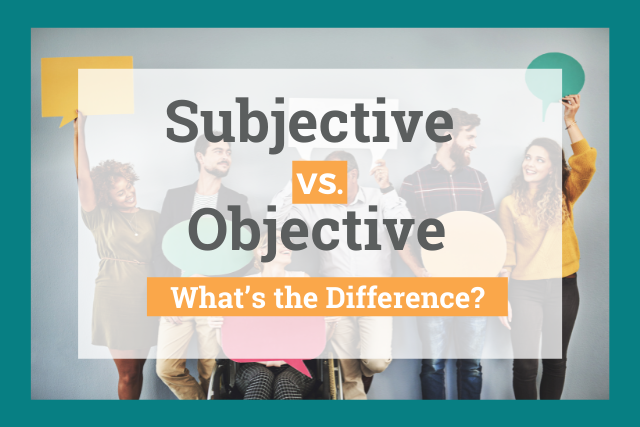
If you’re trying to write a strong essay or story, it’s often important to understand the difference between subjective and objective truth.
What exactly do the words subjective and objective mean, and when should you use each?
This article will explain the difference between the two words, provide examples of how they’re used in a sentence, and discuss whether you should look for objective or subjective information to support your own writing.
- What’s the Difference Between Subjective vs. Objective?
How Would You Use Objective and Subjective in a Sentence?
What are some examples of objective statements, what are some examples of subjective information, how can you tell if something is objective or subjective, what is an objective opinion, are impartial facts better than personal feelings, what’s the difference between subjective vs. objective .
The difference between objective and subjective is related to the difference between facts and opinions.
The word objective describes information that’s based on verifiable facts. Objective truth can be verified by a third party, regardless of who the third party is.
For example, the sentence “The temperature outside is around 10°C” is an objective statement, because that statement will be equally true no matter who says it. Anybody in the world with a working thermometer could verify this statement.
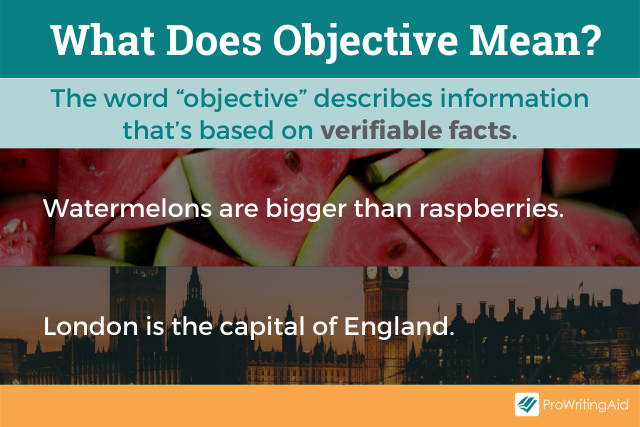
The word subjective is the exact opposite; it describes information that’s based on personal opinion or personal interpretation.
Subjective truth might be different for different people, depending on their own tastes, preferences, or experiences.
The sentence “It’s very cold outside” is a subjective statement, because how true this sentence is depends on personal opinions and experiences.
Many temperatures would feel very cold to someone who grew up in Arizona, but comfortably warm to someone who grew up in Alaska.
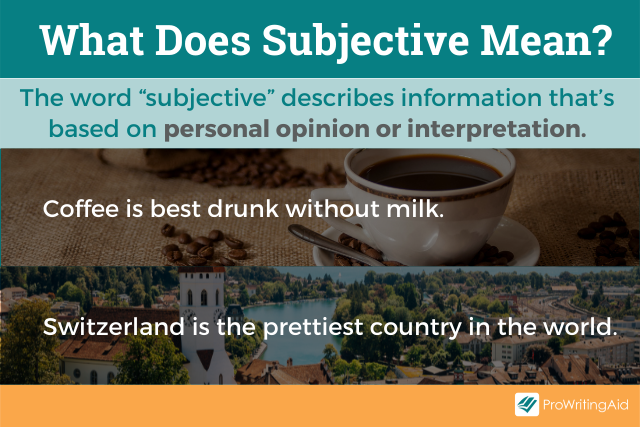
One easy way to remember the difference between the two words is to remember that “objective” sounds like “object.”
Objective facts are as concrete as the objects you can touch, like your desk, your bike, or your water bottle.
Subjective facts, on the other hand, pertain to more abstract concepts, like beauty, joy, or discomfort.
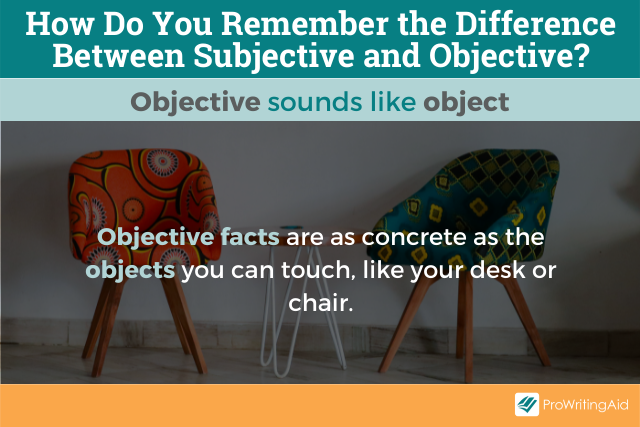
Here’s an example of a sentence that uses both objective and subjective in context:
"But now we, as pathologists, need more objective measures because symptoms, to a certain degree, are subjective ." (Time)
This sentence, a quote from a pathologist, argues that symptoms of diseases are somewhat subjective because they differ from person to person.
One patient with the flu might feel horribly nauseous, while another patient with the same flu might feel only a mild cough.
As a result, it’s useful for doctors to have objective tools to determine how ill people are, which don’t have results that vary from person to person.
That way, they can track the way a disease spreads even if not all patients feel the same symptoms.
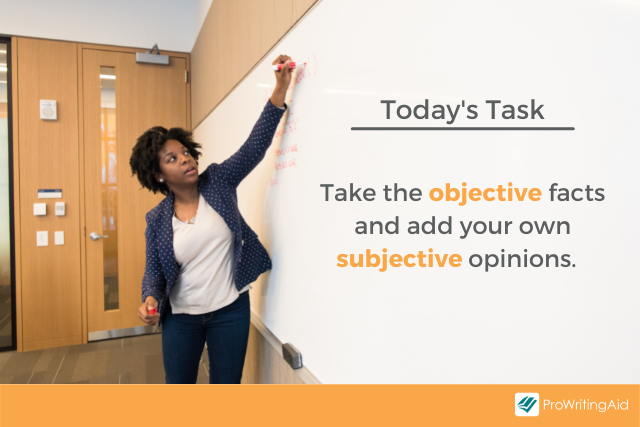
Let’s look at another example.
"We take our unruly, subjective feelings about a year of television and groom them into something that looks mathematical and objective ." (Slate)
This sentence, a quote from a TV critic, argues that trying to rank TV shows is a meaningless task.
Every viewer has different tastes; some might love lighthearted sitcoms, while others prefer serious dramas.
There’s no objective way for a TV critic to determine a Top 10 list that applies to everybody, because everyone’s tastes and enjoyment levels are inherently subjective.
If what you’re writing can be proven or disproven by evidence, it’s an objective statement. Likewise, if you include a reference to an study or an experiment, it is an objective statement.
Remember to always reference information like this. ProWritingAid’s Plagiarism Checker can ensure that you never inadvertently pass off someone else’s work as your own.
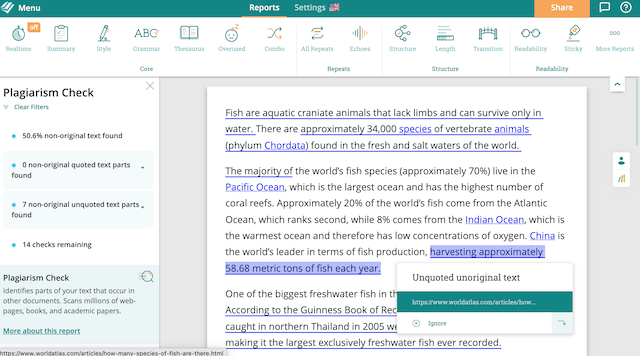
Find out more about Plagiarism Checks.
Here are some examples of objective information:
- The largest freshwater fish ever caught was 646 pounds. (Cite- Brittanica)
- Abraham Lincoln was the sixteenth president of the United States.
- The World Health Organization declared COVID-19 a pandemic on March 11, 2020.
- I have eaten the plums that were in the icebox.
Keep in mind that those statements would still be considered objective even if they were false.
It’s a common mistake to assume that “objective” is synonymous with “true,” but lies can be objective statements, too. The statement remains objective as long as it doesn’t depend on feelings or opinions.
For example, if William Carlos Williams had written “I didn’t eat any of the plums that were in the icebox,” even though he actually did, that would still qualify as an objective statement.
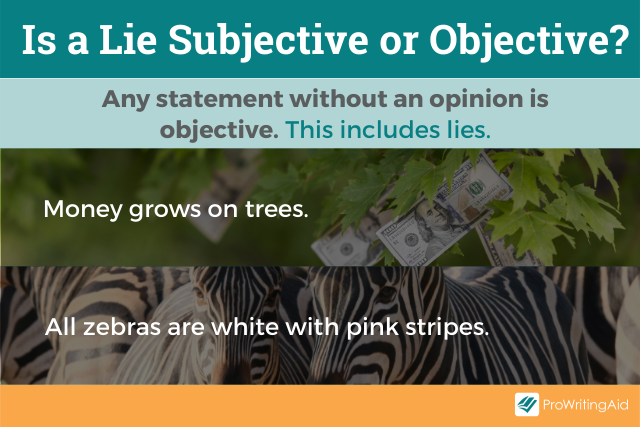
Here are some examples of false objective statements:
- Abraham Lincoln was the first president of the United States.
- The World Health Organization has never issued an official statement about COVID-19.
- I didn’t eat any of the plums that were in the icebox.
If a statement relies on personal feelings or beliefs, it’s likely to be subjective.
Here are some examples of subjective statements:
- It feels very warm outside.
- Dogs are better than cats.
- The plums in the icebox tasted delicious.
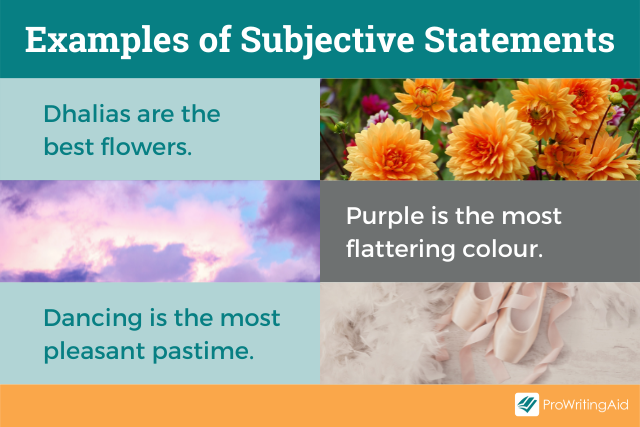
Watch out for subjective information that’s disguised as objective analysis. For example, a newspaper headline that says “New Study Shows That Dogs Are 85% Better Than Cats” sounds like an objective fact. However, because it depends on personal preferences and opinions, it’s still a subjective statement.
Here are some subjective statements that are disguised to sound like objective statements:
- It is objectively very warm outside.
- A new study shows that dogs are 85% better than cats.
- Plums in iceboxes taste ten times better than plums that are left in the heat.
If you’re not sure whether a statement is objective or subjective, here are some useful questions you can ask yourself.
To determine whether a statement is objective , ask:
- Is this statement based on factual evidence?
- Is there a way a scientist could test this statement to figure out if it’s true or false?
- Would a robot without any concept of human emotion be able to say this statement?
If the answers to any of the above questions are “yes,” you’re probably dealing with an objective statement.
To determine whether a statement is subjective , ask:
- Is this statement based on someone’s feelings, preferences, or personal tastes?
- Is it impossible to determine whether this statement is true or false?
- Does this statement make a judgement about something (e.g. good or bad, right or wrong, beautiful or ugly)?
If the answers to any of the above questions are “yes,” you’re probably dealing with a subjective statement.
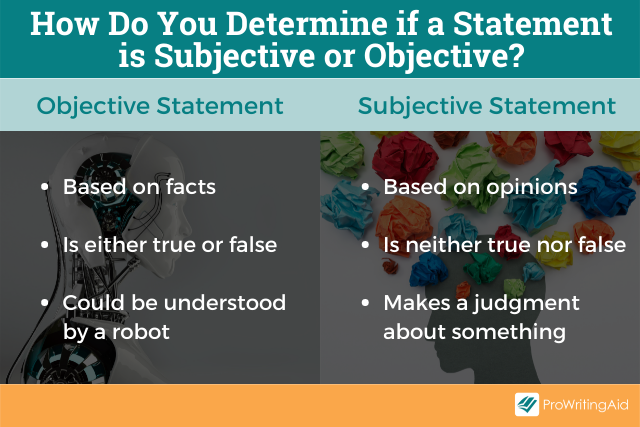
You can also look at the source of the statement to help you figure out how objective it is.
Sources like peer-reviewed scientific articles and unbiased news articles tend to contain more objective material.
Sources like opinion pieces and creative non-fiction tend to contain more subjective material.
The phrase "objective opinion" might seem counterintuitive, since these two words are essentially opposites.
In this context, the word "objective" means unbiased and impartial, rather than factual. This is also true for the phrase "objective assessment."
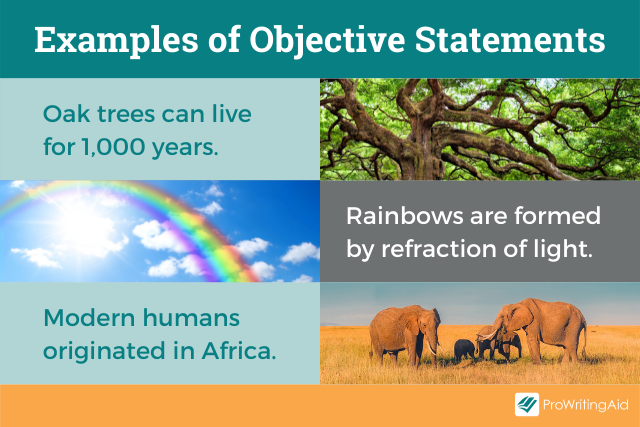
For example, you might ask a friend for an objective opinion about whether or not you should break up with your boyfriend.
In this scenario, your friend can’t give you objective advice if they have a personal reason for wanting you to make this decision, such as if they’re secretly in love with your boyfriend too.
Whether you should use subjective or objective statements depends on what your goal is.
If you’re writing a persuasive essay, you’ll usually need factual or quantitative data to make your writing credible. It’s important to search for objective facts from a reliable and impartial source.
On the other hand, you can also make use of subjective evidence, such as personal anecdotes. If you’re writing a persuasive essay about why bullying is wrong, a heartfelt story from the perspective of someone who’s been bullied might touch more readers than impersonal facts.
Most strong essays make use of both subjective and objective truth.
Final Words on the Difference Between Subjective vs. Objective
There you have it: a comprehensive guide to the difference between subjective and objective statements. Which examples did you find most helpful? Let us know in the comments.
Now is a wonderful time to be a copywriter. Download this free book to learn how:
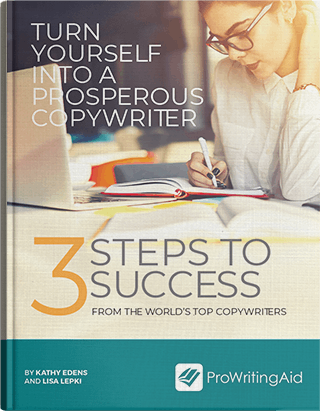
Turn Yourself Into a Prosperous Copywriter
With the advent of the internet, the copywriting industry is exploding. content is now seen as critical for all online businesses., this guide breaks down the three essential steps you must take if you think copywriting is the career for you..

Be confident about grammar
Check every email, essay, or story for grammar mistakes. Fix them before you press send.
Hannah Yang is a speculative fiction writer who writes about all things strange and surreal. Her work has appeared in Analog Science Fiction, Apex Magazine, The Dark, and elsewhere, and two of her stories have been finalists for the Locus Award. Her favorite hobbies include watercolor painting, playing guitar, and rock climbing. You can follow her work on hannahyang.com, or subscribe to her newsletter for publication updates.
Get started with ProWritingAid
Drop us a line or let's stay in touch via :
- Link to facebook
- Link to linkedin
- Link to twitter
- Link to youtube
- Writing Tips
6 Tips on Achieving an Objective Tone in Writing

- 5-minute read
- 11th July 2021
An objective tone is standard in most formal business and academic writing. But how can you make your writing sound objective? Our top tips include:
- Try to avoid unnecessary use of the first person and first-person pronouns.
- Focus on facts and cite sources clearly to back up your claims.
- Aim for balance and consider multiple perspectives.
- Beware of emotive language that betrays a subjective opinion.
- Use a formal writing style throughout.
- Have your writing proofread to make sure it is always error-free.
For more detail on how to achieve an objective tone in writing, read on.
1. Try Not to Use the First Person
Objective writing aims for a neutral, impersonal tone. As such, you should try to minimise the use of the first person and first-person pronouns such as ‘I’, ‘me’ and ‘mine’, which put too much focus on you as the writer of the document.
One option is to use the passive voice more. For instance:
I will outline the main arguments. -> The main arguments will be outlined.
However, this can sound awkward or leave your writing unclear (e.g. the sentence above does not specify who or what will outline the arguments). As such, it is often better to stick to the active voice and use the third person instead. For example:
This paper will outline the main arguments.
Here, the meaning is clear, but we avoid using any first-person pronouns.
2. Focus on Facts and Data
Objective writing should be clear and factual. As such, you will need to:
- Research your topic extensively – Before you start writing, make sure to research the topic in detail so you are clear on the facts.
- Always cite your sources – Citing sources adds credibility to your writing by showing your reader where your information came from.
- Consider your sources – Where you get information from matters. Your sources should be unbiased, especially in academic writing. Before citing something or quoting a fact, then, make sure it is from a trustworthy source .
If you can back up your claims with well-researched facts, your writing will come across as much more objective than if you simply make unsupported claims.
3. Be Fair and Balanced
If you present only one side of an argument in your writing, it could appear biased and lose credibility. To achieve an objective tone, then, you must show balance. And this means sharing different viewpoints and perspectives.
Find this useful?
Subscribe to our newsletter and get writing tips from our editors straight to your inbox.
This is especially important if you are presenting an argument in academic writing where acknowledging potential counterarguments or competing points of view is a key part of testing the strength of your position. But it also applies to business writing, where considering multiple perspectives provides important context and shows that you have researched the issue thoroughly.
You don’t always have to give every opinion equal weight or present every possible argument, though, or you run the risk of overwhelming the reader with too much information. Instead, focus on the key perspectives in the subject area.
4. Avoid Emotive Language
Typically, objective writing should avoid emotive language or words that suggest a subjective opinion. For example:
Smith (2020) offers a brilliantly clever solution to this terrible problem.
Here, the words ‘brilliantly clever’ and ‘terrible’ don’t add anything substantive to the sentence. Rather, they signal something about the author’s opinion. And by adding this kind of emotive language, we prompt the reader to respond in a particular way (e.g. to see the solution as ‘brilliantly clever’).
This is not to say you should never offer an opinion in objective writing (e.g. you may need to weigh the benefits of certain actions and recommend the best option to meet a specific objective, which will inevitably involve an element of opinion). But you should present your opinions in a neutral tone and back them up with facts, not relying on emotive or otherwise subjective language to influence your reader.
5. Keep Your Writing Formal
As well as the subjective and emotive language discussed so far, objective writing should avoid informal and colloquial language. This includes:
- Using standard spelling and grammar throughout.
- Avoiding contractions (e.g. instead of using ‘can’t’, use ‘cannot’).
- Cutting out all slang and informal figures of speech.
- Using the correct technical language for your subject area.
This formal style is common in business and academic writing as it reduces the strength of the individual’s voice and thus contributes to an objective tone.
6. Have Your Work Proofread
Errors in writing suggest a lack of care or attention to detail (even when this isn’t true). To make sure your documents have a truly objective, authoritative tone, then, it pays to get them proofread by the writing experts.
Our editors are available 24/7, all year round, so we are always here to help. You can even try our services for free ! Get in touch today to find out more.
Share this article:
Post A New Comment

Get help from a language expert. Try our proofreading services for free.
9-minute read
How to Use Infographics to Boost Your Presentation
Is your content getting noticed? Capturing and maintaining an audience’s attention is a challenge when...
8-minute read
Why Interactive PDFs Are Better for Engagement
Are you looking to enhance engagement and captivate your audience through your professional documents? Interactive...
7-minute read
Seven Key Strategies for Voice Search Optimization
Voice search optimization is rapidly shaping the digital landscape, requiring content professionals to adapt their...
How to Ace Slack Messaging for Contractors and Freelancers
Effective professional communication is an important skill for contractors and freelancers navigating remote work environments....
3-minute read
How to Insert a Text Box in a Google Doc
Google Docs is a powerful collaborative tool, and mastering its features can significantly enhance your...
2-minute read
How to Cite the CDC in APA
If you’re writing about health issues, you might need to reference the Centers for Disease...

Make sure your writing is the best it can be with our expert English proofreading and editing.
404 Not found
- Search All Scholarships
- Exclusive Scholarships
- Easy Scholarships to Apply For
- No Essay Scholarships
- Scholarships for HS Juniors
- Scholarships for HS Seniors
- Scholarships for College Students
- Scholarships for Grad Students
- Scholarships for Women
- Scholarships for Black Students
- Scholarships
- Student Loans
- College Admissions
- Financial Aid
- Scholarship Winners
- Scholarship Providers
Student-centric advice and objective recommendations
Higher education has never been more confusing or expensive. Our goal is to help you navigate the very big decisions related to higher ed with objective information and expert advice. Each piece of content on the site is original, based on extensive research, and reviewed by multiple editors, including a subject matter expert. This ensures that all of our content is up-to-date, useful, accurate, and thorough.
Our reviews and recommendations are based on extensive research, testing, and feedback. We may receive commission from links on our website, but that doesn’t affect our editors’ opinions. Our marketing partners don’t review, approve or endorse our editorial content. It’s accurate to the best of our knowledge when posted. You can find a complete list of our partners here .
Examples of Scholarship Essays for the “Career Goals” Question

Emily Wong is a writer at Scholarships360. She’s worked as a social media manager and a content writer at several different startups, where she covered various topics including business, tech, job recruitment, and education. Emily grew up and went to school in the Chicago suburbs, where she studied economics and journalism at Northwestern University.
Learn about our editorial policies

Maria Geiger is Director of Content at Scholarships360. She is a former online educational technology instructor and adjunct writing instructor. In addition to education reform, Maria’s interests include viewpoint diversity, blended/flipped learning, digital communication, and integrating media/web tools into the curriculum to better facilitate student engagement. Maria earned both a B.A. and an M.A. in English Literature from Monmouth University, an M. Ed. in Education from Monmouth University, and a Virtual Online Teaching Certificate (VOLT) from the University of Pennsylvania.

Writing an essay is often the trickiest part of the scholarship application, not to mention the most time-consuming. However, the essay section also allows room for creativity and individuality. If you can communicate effectively, you can use the essay portion to stand out from the crowd. Let’s go over some tips for writing, as well as a couple of scholarship essay examples about career goals.
How to write a scholarship essay
At this point, you’ve probably gained plenty of experience writing papers for school. However, it may still take a couple of tries to nail the scholarship essay. Since scholarship teams often have to get through a lot of applications, it’s important to stand out while staying concise. Here are some simple guidelines for writing scholarship essays.
See also: How to write a winning scholarship essay (with examples!)
Take five minutes to brainstorm
Before you even start your essay, take some time to gather your thoughts. Think about what you’ll want the paper to focus on. Why did you choose to pursue your career path in the first place? Where do you want to be in five years? How would this scholarship help you further your studies and work toward your goals?
Once you’ve jotted down a few ideas, choose one or two to center your essay on. Identifying the focus of your paper, it’ll make it easier to keep your thoughts organized. In turn, it’ll make it easier for the reader to follow.
Related : How to start a scholarship essay (with examples!)
Stay within the word limit
Unlike the four-page essays that you may have written in English class, scholarship essays are often only a paragraph or two. In order to respect the selection committee’s time, be wary of going too far about the specified word count. A general rule of thumb is to stay within 20 words above or below the limit. That may entail a few rounds of edits to get the wording just right.
Stay positive!
Feel free to use part of your essay to talk about your life’s challenges. After all, the selection committee often wants to give the award to a candidate who needs it. However, make sure your anecdote doesn’t devolve into a sob story. If you’re going to bring up hardships you’ve endured, try to balance it by talking about how you’ve overcome them. By demonstrating resilience, you can show readers how you would use the scholarship to succeed in your current situation.
Leave time to proofread
Especially for a short scholarship essay, proofreading can take as little as 5-10 minutes. Still, it can be tempting to just hit “submit” after your first draft. However, being too impulsive can leave your essay riddled with typos and grammatical errors.
Try to avoid unnecessary mistakes by finishing your draft at least 24 hours before the scholarship deadline. That way, you can proofread it with fresh eyes before you submit it.
If you’re struggling to close out your essay, read how to end a scholarship essay in five steps .
Apply to these scholarships due soon

$10,000 “No Essay” Scholarship

$2,000 Sallie Mae Scholarship

$40,000 Build a College List Scholarship

Niche $25,000 “No Essay” Scholarship

$25k “Be Bold” No-Essay Scholarship

$10,000 CollegeXpress Scholarship

$1,000 Appily Easy College Money Scholarship

$5,000 Christian Connector Scholarship

$2,000 No Essay CollegeVine Scholarship
How to write a 100-word “career goals” essay.
When writing a 100-word essay, you’ll have to choose your content carefully. Since space is limited, you’ll want to identify the most important details to include beforehand.
First and foremost, make sure to clearly communicate your current pursuits. Talk about your academic and extracurricular activities related to your career goals. Additionally, it’s important to be specific about what you plan to do in the future. Then, if you have extra room, you can talk about how the scholarship will help you reach your goals.
My name is Alison MacBride, and I’m a sophomore at the University of Illinois. I’m currently pursuing a major in Journalism with a minor in Natural Resource Conservation. After completing my program, I plan to combine my areas of interest to become an environmental journalist.
During high school, I volunteered at an eco-conscious farm, where I learned about how our actions affect the earth. Since then, I’ve been set on raising awareness for the environment. This scholarship would go a long way in helping me finish my degree with the skills I need to investigate and report about critical issues.
Word count: 100
How to write a 250-word “career goals” essay
For the 250-word essay, you can go into more detail. Give the readers some context by talking about how you first got interested in your chosen career. Storytelling can be especially effective in engaging your audience. Try to capture their attention by choosing one or two concrete examples and relaying them vividly.
Additionally, you can spend more time talking about the scholarship and how it’ll make a difference in your studies. Go into more detail about how and why you need the award, but remember to keep it positive! For more help, check out how to write a 250 word essay .
I first decided that I wanted to pursue a career in environmentalism in early high school. The summer after my freshman year, I joined a volunteer program at an eco-conscious farm in my community. In addition to helping out with the operations, I learned about current environmental issues related to farming and other consumer industries.
After learning about the agricultural industry’s impact on the planet, I was inspired to make a difference. The next year, I started a monthly earth magazine at my high school in which we broke down environmental issues and offered tips on how to be more eco-friendly. When I started college, I founded an on-campus publication with the same mission.
In recent years, I’ve been troubled to see how some media outlets downplay the gravity of issues like climate change and deforestation. I’ve admired reporters who publish trustworthy and comprehensible information about environmental issues, and I aim to follow in their footsteps.
When I entered college, I was initially concerned that I wouldn’t have enough money to finish my degree. Fortunately, I’ve been able to cover most of my tuition using merit scholarships and paychecks from my part-time job on campus. Receiving this scholarship would allow me more time to focus on acing my classes and pursuing environmental advocacy work on campus.
Word count: 261
Final thoughts
Planning is essential in making your “career goals” essay clear and concise. Hopefully, these scholarship essay examples about career goals can be your guide to writing a scholarship-winning essay. Good luck!
Additional resources
Maybe you need to write a longer scholarship essay? We can help with our writing a 500 word essay guide ! Be prepared and learn how to write essays about yourself and how to craft an impressive personal statement . Learn the differences between a personal statement and a statement of purpose as the terms might come up on college websites. If you haven’t decided on a college already, check out our guide on how to choose a college . No matter where you are in your educational journey, make sure that you apply for all the scholarships you qualify for!
Start your scholarship search
- Vetted scholarships custom-matched to your profile
- Access exclusive scholarships only available to Scholarships360 members
Scholarships360 Recommended

Top 64 No Essay Scholarships in May 2024

Top 260 Scholarships for High School Juniors in May 2024

$20k+ in Exclusive Scholarships from Scholarships360
Trending now.

Top 55 Easy Scholarships✅ to Apply For in May 2024

Top 1,328 Scholarships for High School Seniors in May 2024

Top Scholarships for Current College Students in May 2024
3 reasons to join scholarships360.
- Automatic entry to our $10,000 No-Essay Scholarship
- Personalized matching to thousands of vetted scholarships
- Quick apply for scholarships exclusive to our platform
By the way...Scholarships360 is 100% free!
How to Write an Awesome Essay About Your Career Goals
- Before you begin, ask yourself a few key questions like:
- What are my short-term and long-term career goals?
- Where do I see myself in ten years?
- What events in my life have led me to have these goals?
- What major will help me reach my goals?
- What skills do I need to reach my goals?
- What impact do I want to have on society?
Career Goals Essay Template
Need more inspiration.
After you brainstorm the responses to these questions, look for common themes, or pick out the most interesting stories. You can build your main essay “thesis” or idea around this.
Once you’ve got the main idea, create an outline to put your ideas into essay format. This will give you a general idea of structure.
You can use the career essays template below to give you some ideas. But remember that some rules are meant to be broken, so don’t be afraid to be innovative and think outside the box!
Also, when you’re done, head over to Going Merry to apply for the Career Goals scholarship essay bundle (one essay, one application, multiple scholarships!). You might as well make that essay count. Sign up for Going Merry to apply for scholarships more efficiently.

Here’s a paragraph-by-paragraph breakdown:
Paragraph 1 : Establish the main theme of what you’re going to talk about. It should also grab the reader’s attention. For example, instead of starting your essay with something generic (e.g. Ever since I was a little girl, I wanted to be a zoologist), get creative with it! Try something like My greatest memory as a young girl was going to the zoo for the first time or While most kids play house or school, I always wanted to play zookeeper.
Paragraph 2 : Elaborate on what inspired your career goals. Perhaps it was a relative, a TV show, or simply an experience that you had. Remember that old writing adage, “Show, don’t tell.” In other words, try to demonstrate your interest with story or description.
Paragraph 3 : Discuss your short-term career goals and your intended major. How will your intended major help you reach these goals? What skills do you need to learn to reach them? At the end of the paragraph, try discussing how your short-term goals can help you achieve your long-term goals.
Paragraph 4 : Focus on your long-term goals and the impact that you hope to have on society. If you’re not sure what your long-term goals are, don’t sweat it; they’ll probably change anyways. You can instead focus on the difference you’d like to make overall. And don’t worry too much about the size of the impact…remember that just doing what you’re truly passionate about has a massive impact on those around you.
The last paragraph is your conclusion. You can use this paragraph to summarize what you discussed in the previous few paragraphs. If you want to be even more creative, try ending your essay with a question for your readers or a new insight. Good luck!
And now that you’re ready with that essay, put it to good use! You can recycle that same essay, when applying for the Career Goals Scholarship Bundle. We’ve joined together multiple scholarships (all requesting essays on career goals), into just ONE simple application! See more info here , or just sign up to get going.
Check out examples from other students just like you. Here are links to some great career goal essay examples:
- Example 1
- Example 2
- Example 3
Or maybe you’re looking for help with an academic goals essay — we’ve got you covered there too.
Also, check out this helpful list of the 10 most common scholarship essay topics !

Sign up for Going Merry today, and upload your career goal essay right to your profile. It’s that easy!
- Recent Posts
- 7 Outstanding Oregon Scholarships for 2021 - November 6, 2020
- Great Scholarships for Students in Ohio for 2021 - November 4, 2020
- Great Scholarships for Students in Texas for 2021 - July 30, 2020
Ready to find scholarships that are a match for you?
- AI Content Shield
- AI KW Research
- AI Assistant
- SEO Optimizer
- AI KW Clustering
- Customer reviews
- The NLO Revolution
- Press Center
- Help Center
- Content Resources
- Facebook Group
Descriptive Essay Example: Objective, Types and Ideas
Table of Contents
Descriptive essays are a type of essay in which a writer describes a specific subject in detail. The author uses vivid language to paint a picture in the reader’s mind by engaging the human senses.
Whether you are writing about a person or event, descriptive essays use strong adjectives and adverbs to present sensory details.
This article analyzes the descriptive essay and provides a detailed writing guidance with examples.
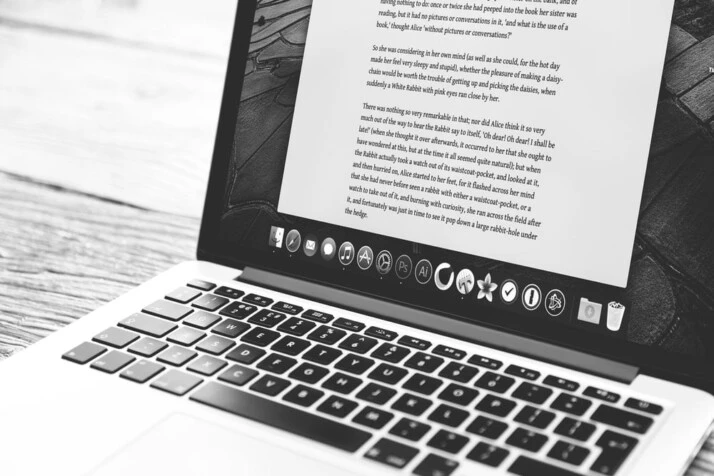
Objective and Purpose of a Descriptive Essay
A descriptive essay is a sort of composition or paper in which an object, person, process, or event is described . The writer’s objective is to produce a lively reading experience or to show rather than tell (metaphorically).
Typically, descriptive writing appeals to all five senses: taste, touch, smell, and sight. The key to creating a successful descriptive essay is to always appeal to the senses.
The purpose of a descriptive essay is to construct a complete image for the reader via the use of the five senses. Your work should have a purpose.
It might be anything, from a lesson you gained from an experience to a tale about how an object influenced your life. It is all about bringing your brilliant ideas to reality.
Description Vs. Descriptive Essay
When writing this form of paper, it is essential to understand the distinction between a description and a descriptive essay.
A description may consist of a single paragraph or numerous paragraphs with no particular organization. In contrast, a descriptive essay contains at least five paragraphs and a clear, comprehensive structure.
Typically, a descriptive essay is coherent and contains a strong thesis statement at the end of the introduction, three body paragraphs, and a conclusion.
However, a description is not necessarily structured. Its primary objective is to provide a detailed description of an object or other subject, devoid of academic complexities.
Types of Descriptive Essay Example
1. personal essay.
You must describe your experience utilizing your emotions and reactions. Your essay should draw a reader’s empathy.
To write a successful personal essay, you should focus on only those specific components that convey your experience. In this type of work, you should use vivid, emotive language.
Examples of personal essays include:
- Providing a description of summertime swimming in the azure sea
- Describe your preferred film and its impact on you.
- Consider your last birthday and all that has shaped you over the previous years.
2. Formal Description
This descriptive writing is similar to an argumentative essay. Your primary objective should be conveying a list of critical points or discussing something in depth, using a clear framework.
You must use specific types of information rather than your personal experience to get the best idea of what you are describing.
This method can also be intriguing, mainly when the reader is more interested in the paper’s topic than the author’s response. Nonetheless, avoid using overly formal terminology.
Topics for formal descriptions can include:
- A descriptive essay on global warming, politics, or historical events.
- A news article that provides a summary of an event or location-specific information.
Description Essay Subject Theme and Ideas
Finding themes for descriptive essays is not difficult. You can describe virtually anything, from your favorite automobile to the current weather. We have compiled some suggestions to help you get started.
Hopefully, these descriptive essay ideas will inspire your creativity.
1. Describe a Person
Choose a person you know well, as this will provide you with much material to write about. Choose from family, friends, and teachers, among others.
You can even write about celebrities whose private lives are primarily visible to the public, such as the Kardashians or Taylor Swift.
A well-known superhero such as Spider-Man is also intriguing. Such fictional characters have been the subject of several academic and non-academic character analyses.
2. Describe an Item or a Location
You may also describe an object or location to which you have a unique relationship. This may be your high school, a playground, or a scary item from your childhood. Even fictional places count!
3. Describe a Feeling
Remember the most genuine emotion you’ve ever felt and write an essay describing it. You may select an intense emotion such as anger, happiness, loss, desire, or rage. It need not be a personal emotion; it can be an observed emotion.
You can create a descriptive essay about anything you can describe using the five human senses: touch, sight, smell, and hearing.
A descriptive essay uses techniques to make readers imagine a scene, a particular person, or a person’s characteristic .
Writing a descriptive essay is easier than you think. There is no right or wrong way. Start by focusing on your thoughts, feelings, and external activities. Pictures are beneficial when it comes to writing. Write about what you know and what you have experienced.

Abir Ghenaiet
Abir is a data analyst and researcher. Among her interests are artificial intelligence, machine learning, and natural language processing. As a humanitarian and educator, she actively supports women in tech and promotes diversity.
Explore All Descriptive Text Articles
Effective writing tips to describe a person.
As with any piece of writing, it’s essential to paint a picture vividly and make your reader fully grasp your…
- Descriptive Text
Best Words to Describe Your Personality
There are instances when you’ll be required to describe yourself. It can be for a job interview or when introducing…
30+ Interesting Words To Describe Beauty
Beauty is the quality of being physically or visually attractive. It is the aesthetic properties of an entity, a natural…
Interesting Adjectives to Describe Movies
You might need to give a review about a movie you just watched. While you can use a few phrases…
Interesting Personality Adjectives to Describe People
What words best describe you? Funny? Determined? Hardworking? These words are adjectives. Adjectives modify one’s personality. They’re an easy and…
The Most Creative Words to Describe Smell
When depicting smell, descriptive language can help the reader have a much more vivid experience. This article explores the best…

Sample Study/Research Objectives for Fulbright Scholarship
by Talha Omer, MBA, M.Eng., Harvard & Cornell Grad
In statement of purpose.
With an admissions rate of less than 20%, even applicants with the most outstanding profiles and GRE test scores get rejected from the Fulbright program. What sets successful Fulbright applicants stand out are their unique experiences, achievements and their ability to bring a positive change towards the society in which they live. Hence this makes the Study/Research Objectives the most crucial element of your Fulbright application.
In this post, I am going to share with you the study/research objectives of a successful Fulbright applicant — her goals, career aspirations, achievements, dreams, and challenges. But before I do that, do know that a study/research objective is all about answering two primary questions: “What you want to study” and “Why you want to study it?”.
Through these questions, you have to demonstrate that you are mature enough to make logical future goals and not mere impulsive ones. In your answers, Fulbright expects you to be specific by telling about your majors and field of interest and also by telling the exact program you want to pursue. Moreover, you have to explain how this degree is a natural fit and is aligned with your previous experiences and how will it help you achieve your future goals.
Writing a study objective is not JUST answering these questions one by one. It is about telling a good story that answers all of the above in a lucid and captivating manner. It’s not about dramatizing things – as if copying plots from Harry Potter. It’s about making sure to tie together answers to the above questions.
By the way, the exact question on study/research objectives is as follows:
Write a clear and detailed description of your study/research objectives, and give your reasons for wanting to pursue them. Be specific about your major field and your specialized interests within this field. Describe the kind of program you expect to undertake, and explain how your study plan fits in with your previous training and your future objectives. This statement is an essential part of your application and is required. Do not mention specific U.S. universities at which you would like to study. (Please limit your response to 700-750 words.)
And the following study objective has answered this exact same question. Read on and get inspiration from this applicant.
Sample Study Research Objectives (SRO) for Fulbright Scholarship
My country, a nation created as the first home for the British-India Muslims almost six decades ago today, represents one of the world’s most troubling states on the brink of an economic catastrophe. Record levels of unemployment, unprecedented inflation rates, ever-increasing fiscal deficit, and looming energy crises; are just a few of the vices which have crippled my country at a macro level. Having nearly averted a balance of payments crisis back in 2008, with help from the International Monetary Fund, my country is again headed on a path of self-annihilation. Despite being rich in natural resources and self-sufficient in food production, our economic infrastructure is falling apart daily. So one is forced to ponder, but why? What makes us fail where others have succeeded? What makes us weak while others grow strong, but how do we make things right?
A childhood inquisition into finding an answer to these questions introduced me to economics. My first degree in the chosen subject gave me a well-rounded coverage of the discipline. It helped me develop an open-minded and scientific approach to problem-solving, including mathematical and statistical abilities. It imparted the necessary training to analyze and develop solutions for various micro and macroeconomic problems. With time, what started as a mere curiosity, slowly took the form of a passion: a desire to understand and decode and to learn how all the dots connect to form a complete picture.
After graduation, my induction into the Corporate Finance & Planning division at UCH Power, country’s second-largest independent power producer with a gross capacity of 586MW, allowed me to transition into the practical world. However, this in no way diminished my resolve to understand and evolve solutions for my country’s problems. My move to UCH culminated in my desire to under the grass root reality of the key issues plaguing the economy’s most wrecked sector: The Energy Sector. Electricity shortages have crippled the economy and have often led to violent protests in recent years. As a result, thousands of industrial units have been forced to shut down operations, affecting industrial output and the livelihoods of thousands of families. Furthermore, the country’s primary reliance on imported oil for power generation makes it vulnerable to volatility in international prices. To make matters worse, the electricity supply gap is projected to increase in the coming years, thereby imposing the need for significant investments in the power sector on a priority basis.
As an integral part of UCH’s Corporate Finance and Planning team, I have been primarily responsible for invoicing, research, reporting, and treasury functions. This affiliation has allowed me to interact with notable industry leaders, key government representatives, and distinguished members of the finance community. Furthermore, as part of a larger team, I have undertaken several projects to spread knowledge about the ills of energy sector and have learned and grown immensely. For instance, while working on numerous presentations and formulating economic reviews for our CEO, I have had the opportunity to educate myself on the lapses in our economic and energy planning system, which has marred our country brutally. Furthermore, participation in the recently held Annual Energy Conference, the biggest energy convention of the year, provided me with a formal platform to meet local and international stakeholders and policymakers to discuss and analyze key energy issues and their possible solutions. This has gone a long way in boosting my self-confidence while simultaneously providing me with the unique opportunity to hear the viewpoints of notable personalities within the energy sector. Therefore, despite being part of the corporate world, I have continued on my quest to seek answers to the questions that have plagued my inquisitive mind since my freshman days at college.
Having spent the last two years as part of the worst-hit sector, I have come to the grim conclusion that our problem is not one of resource shortage but one of grave resource mismanagement. Policymakers in my country have failed to foresee and plan for the growing energy demand. Despite being blessed with numerous geographical locations ideally suited for the construction of hydroelectric dams, our country’s reliance on imported oil for power generation grows by the year. Renewable energy remains a relatively unexplored concept. To make matters worse, even in the face of certain disasters, our policymakers have failed to devise a viable plan to put our country back on the path to recovery. Having said so, my choices are now clear: to be a silent observer and see my country torn apart or become part of the system and change it from within. I choose the latter.
However, despite such a productive work experience, I recognize the need for an advanced degree in the discipline if I seek to be truly effective in achieving my future goals. A master’s degree which can equip me with the skills required to effectively design and implement an economic policy with a strong emphasis on the economic problems of developing and transition economies will go far in helping me achieve my career goals upon my return to my homeland. Furthermore, I firmly believe that by pursuing a master’s degree in economic/public policy from a reputable graduate school, I will have the opportunity to truly understand and appreciate the competing interests and views surrounding a variety of complex issues about the sector’s policy framework, investment regime, institutions, and energy security.
Upon my return, I would like to seek employment with USAID, ADB, World Bank, or any of the other international development aid organizations as part of their project planning and mobilization team. Having previously been part of the team responsible for the planning and development of UCH II, a 404MW capacity expansion project for UCH Power, I will be uniquely placed to take advantage of the previously gained insight into the energy sector to ensure proper planning and utilization of development grants and loans. This will also allow me to put my newly acquired knowledge to practical use by working with national and international policymakers to correct the inherent flaws in our national planning process.
Sample SOP for PHD in AI (Artificial Intelligence)
Growing up in Kuala Lumpur, the bustling heart of Malaysia, I was exposed to a significant urban-rural divide in healthcare access. The influx of people from rural areas into the city for advanced medical care highlighted the lack of sophisticated medical facilities...
Sample Statement of Purpose for Masters in Public Policy (MPP)
Sample Statement of Purpose for Masters in Public Policy (MPP) India is a place of immense challenges and opportunities. On the one hand, limited state capacity in a country with a burgeoning population results in unmet needs for basic amenities such as healthcare,...
Sample Statement of Purpose for Banking and Finance
Sample Statement of Purpose in Finance The Fall of Silicon Valley Bank, Signature Bank, and Credit Suisse has again raised the debate about the role of central bankers, deposit insurers, and regulators in modern-day banking. World has been through similar or worse...
Sample Statement of Purpose for Cyber Security
Sample Statement of Purpose for Cyber Security I am applying to pursue a master's degree in Cybersecurity with a special focus on Software Security and Data Privacy. My ultimate goal is to improve the cybersecurity posture of the US by collaborating with key...
Sample SOP for Business Analytics
The following SOP was written by an applicant who was admitted to top MSBA (Masters of Science in Business Analytics) programs in the US. Variations of this essay got accepted at Duke, UT Austin, and UCLA. This statement of purpose is intended to provide an example...
Sample Stanford Computer Science Statement of Purpose
The following statement of purpose is written by an applicant who got accepted to Stanford's doctoral programs in computer science. Stanford's CS program requires a 2-page statement of purpose that covers the following points: Should be concise, focused, and well...
Sample Harvard MPH Statement of Purpose
The following statement of purpose is written by an applicant who got accepted to Harvard's master’s programs in public health. Harvard's MPH program requires a 600-word statement of purpose that covers the following points: Academic and/or professional preparation...
Sample Statement of Purpose in Public Health (MPH)
The following statement of purpose is written by an applicant who got accepted to several top master's programs in public health. Variations of this SOP got accepted at Rutgers, and Chicago. Read it to understand what a top SOP in MPH should look like. Example...
Sample Statement of Purpose for Nursing
The following statement of purpose was written by an applicant who was admitted to top MSN (Masters of Science in Nursing) programs in the US. The applicant aspires to specilize in the field of nursing informatics. Variations of this SOP got accepted at Johns Hopkins...
Sample Statement of Purpose Cancer Research (Ph.D.)
The following statement of purpose is written by an applicant who got accepted to top Ph.D. programs in cancer research/cancer biology. Variations of this SOP got accepted at JHU. Read this essay to get inspiration and understand what a top Ph.D. SOP should look like....
WANT MORE AMAZING CONTENT?
- Free GRE Practice Questions
- 100+ Personal Statement Templates
- 100+ Quotes to Kick Start Your Personal Statement
- 390 Adjectives to Use in a LOR

IMAGES
VIDEO
COMMENTS
Academic writing is generally impersonal and objective in tone. This section considers what objective writing is, how objective academic writing is, then presents several ways to make your writing more objective.There is also an academic article, to show authentic examples of objective language, and a checklist at the end, that you can use to check the objectivity of your own writing.
For example, personal essays and opinion papers are examples of texts that contain subjective writing, because they contain subjective language. Subjective language includes words that indicate a ...
Objective writing is writing that presents information in a neutral and unbiased way. This means avoiding personal opinions, beliefs, or biases. It also means avoiding using emotional language or making subjective statements. Objective writing is typically clearer and easier to understand than subjective writing.
In short, differences between these styles concern the following: The ground for objective essays is facts; for subjective essays - personal opinions and beliefs. Objective papers report the findings from scientific sources, while subjective ones describe the writer's thoughts. The objective essay's goal is to help the reader make a decision.
Step 4. State the opposing argument in your next paragraph or chapter. Use words and phrases that express the change of direction within the essay, such as "however," "although" and "on the other hand.". Include comments that contrast the preceding paragraphs. For example, you may be writing about Freud, and your contrasting ...
Expository essay example paragraph. The invention of the printing press in 1440 changed this situation dramatically. Johannes Gutenberg, who had worked as a goldsmith, used his knowledge of metals in the design of the press. ... Its thesis statement makes a contentious claim that must be supported in an objective, evidence-based way.
Academic writing style refers to the rules and conventions for producing written work in academic contexts. Although variations exist across disciplines, we can identify some common features: Clarity. This Survival Guide focuses on the second feature, objectivity. Writing in an objective or impersonal way enables you to sound more convincing or ...
Writing objectively. Being objective suggests that you are concerned about facts and are not influenced by personal feelings or biases. Part of being objective is being fair in your work. Try to consider both sides of an argument and avoid making value judgements by using words such as wonderful or appalling.
This example guides you through the structure of an essay. It shows how to build an effective introduction , focused paragraphs , clear transitions between ideas, and a strong conclusion . Each paragraph addresses a single central point, introduced by a topic sentence , and each point is directly related to the thesis statement .
The basic structure of an essay always consists of an introduction, a body, and a conclusion. But for many students, the most difficult part of structuring an essay is deciding how to organize information within the body. This article provides useful templates and tips to help you outline your essay, make decisions about your structure, and ...
The difference between objective and subjective is related to the difference between facts and opinions. The word objective describes information that's based on verifiable facts. Objective truth can be verified by a third party, regardless of who the third party is. For example, the sentence "The temperature outside is around 10°C" is ...
The definition of objective vs subjective. The word objective refers to facts that are provable or verifiable. Objective statements and observations don't include people's personal views and preferences, known as biases. Subjective, on the other hand, refers to personal feelings, viewpoints, opinions, and biases.
1. Try Not to Use the First Person. Objective writing aims for a neutral, impersonal tone. As such, you should try to minimise the use of the first person and first-person pronouns such as 'I', 'me' and 'mine', which put too much focus on you as the writer of the document. One option is to use the passive voice more. For instance:
Objective Essay Sample: The Portrayal von Ulysses . Real: In Odyssey, Homer portrays Odysseus, the king of Ithaca, as the true appreciation hero. The presentation to Ulysses is thoughtfully knitted together with this key of love and loyalty that further magnify to, painting a holistic pic of a long 10-year journey home. Although e sack be ...
An argumentative essay should be objective in its approach; your arguments should rely on logic and evidence, not on exaggeration or appeals to emotion. There are many possible approaches to argumentative essays, but there are two common models that can help you start outlining your arguments: The Toulmin model and the Rogerian model.
How to write a 100-word "career goals" essay. When writing a 100-word essay, you'll have to choose your content carefully. Since space is limited, you'll want to identify the most important details to include beforehand. First and foremost, make sure to clearly communicate your current pursuits.
This college essay tip is by Abigail McFee, Admissions Counselor for Tufts University and Tufts '17 graduate. 2. Write like a journalist. "Don't bury the lede!" The first few sentences must capture the reader's attention, provide a gist of the story, and give a sense of where the essay is heading.
Career Goals Essay Template. Here's a paragraph-by-paragraph breakdown: Paragraph 1: Establish the main theme of what you're going to talk about.It should also grab the reader's attention. For example, instead of starting your essay with something generic (e.g. Ever since I was a little girl, I wanted to be a zoologist), get creative with it!
Table of contents. Step 1: Reading the text and identifying literary devices. Step 2: Coming up with a thesis. Step 3: Writing a title and introduction. Step 4: Writing the body of the essay. Step 5: Writing a conclusion. Other interesting articles.
A descriptive essay is a sort of composition or paper in which an object, person, process, or event is described. The writer's objective is to produce a lively reading experience or to show rather than tell (metaphorically). Typically, descriptive writing appeals to all five senses: taste, touch, smell, and sight.
What sets successful Fulbright applicants stand out are their unique experiences, achievements and their ability to bring a positive change towards the society in which they live. Hence this makes the Study/Research Objectives the most crucial element of your Fulbright application. In this post, I am going to share with you the study/research ...
Example: Research aim. To examine contributory factors to muscle retention in a group of elderly people. Example: Research objectives. To assess the relationship between sedentary habits and muscle atrophy among the participants. To determine the impact of dietary factors, particularly protein consumption, on the muscular health of the ...